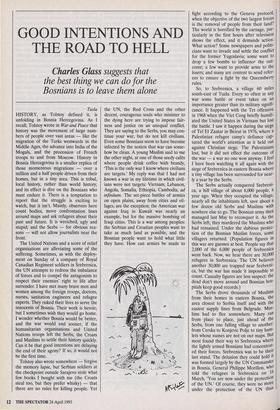GOOD INTENTIONS AND THE ROAD TO HELL
Charles Glass suggests that
the best thing we can do for the Bosnians is to leave them alone
Tuzla HISTORY, as Tolstoy defined it, is unfolding in Bosnia Hercegovina. As I recall, Tolstoy wrote in War and Peace that history was the movement of large num- bers of people over vast areas — like the migration of the Turks westwards in the Middle Ages, the advance into India of the Moguls, and the procession of French troops to and from Moscow. History in Bosnia Hercegovina is a smaller replica of those momentous migrations — over a million and a half people driven from their homes, but in a tiny area. This is tribal, local history, rather than world history, and its effect is dire on the Bosnians who must endure it. There is a temptation to report that the struggle is exciting to watch, but it isn't. Mainly, observers here count bodies, move confrontation lines around maps and ask refugees about their past and future. It is wretched, ugly and stupid; and the Serbs — for obvious rea- sons — will not allow journalists near the front.
The United Nations and a score of relief organisations are alleviating some of the suffering. Sometimes, as with the deploy- ment on Sunday of a company of Royal Canadian Regiment soldiers in Srebrenica, the UN attempts to redress the imbalance of forces and to compel the antagonists to respect their enemies' right to life after surrender. I have met many brave men and women among the foreign troops, doctors, nurses, sanitation engineers and refugee experts. They risked their lives to serve the innocents of Bosnia. Their work is heroic, but I sometimes wish they would go home. I wonder whether Bosnia would be better, and the war would end sooner, if the humanitarian organisations and United Nations troops left the Serbs, the Croats and Muslims to settle their history quickly. Can it be that good intentions are delaying the end of their agony? If so, it would not be the first time.
Tolstoy also wrote somewhere — forgive the memory lapse, but Serbian soldiers at the checkpoint outside Sarajevo stole what few books I bought with me (the Croats steal too, but they prefer whisky) — that there are no rules for killing people. Yet the UN, the Red Cross and the other decent, courageous souls who minister to the dying here are trying to impose fair- ness and justice on an unequal conflict. They are saying to the Serbs, you may con- tinue your war, but do not kill civilians. Even some Bosnians seem to have become infected by the notion that war can some- how be clean. A young Muslim said to me the other night, at one of those seedy caffs where people drink coffee With brandy, `This is the only war I know where civilians are targets.' My reply was that I had not known a war in my lifetime in which civil- ians were not targets: Vietnam, Lebanon, Angola, Somalia, Ethiopia, Cambodia, ad infinitum. The set-piece battles of armies on open plains, away from cities and vil- lages, are the exception; the American war against Iraq in Kuwait was nearly an example, but for the massive bombing of Iraqi cities. This is a war among peoples: the Serbian and Croatian peoples want to take as much land as possible, and the Bosnian people want to hold what little they have. How can armies be made to fight according to the Geneva protocol, when the objective of the two largest forces is the removal of people from their land? The world is horrified by the carnage, par- ticularly in the first hours after television shows the effect, and it demands action. What action? Some newspapers and politi- cians want to invade and settle the conflict for the former Yugoslavia; some want to drop a few bombs to influence the out- come; a few want to provide arms to the losers; and many are content to send refer- ees to ensure a fight by the Queensberry rules.
So, to Srebrenica, a village 60 miles south-east of Tuzla. Every so often in any war some battle or event takes on an importance greater than its military signifi- cance. It happened with the Tet offensive in 1968 when the Viet Cong briefly humili- ated the United States in Vietnam but lost the battle. I saw it happen during the siege of Tel El Zaatar in Beirut in 1976, where a Palestinian refugee camp's defiance cap- tured the world's attention as it held out against Christian siege. The Palestinians lost, but it did not effect the outcome of the war — a war no one won anyway. I feel I have been watching it all again with the siege of Srebrenica in eastern Bosnia where a tiny village has been surrounded for near- ly a year by the Serbs.
The Serbs actually conquered Srebreni- ca, a hill village of about 6,000 people, a year ago. When they occupied the village, nearly all the inhabitants left, save about a few dozen old Serbs and Muslims with nowhere else to go. The Bosnian army then managed last May to reconquer it. As the Serbs left, they murdered the Muslims who had remained. Under the dubious protec- tion of the Bosnian Muslim forces, some villagers returned. (Population figures in this war are guesses at best. People say that 2,000 of the 6,000 people of Srebrenica went back. Now, we hear there are 30,000 refugees in Srebrenica. The UN believes another 30,000 are trapped near Srebreni- ca, but the war has made it impossible to count. Casualty figures are less suspect: the dead don't move around and Bosnian hos- pitals keep good records.) The Serbs drove thousands of Muslims from their homes in eastern Bosnia, the area closest to Serbia itself and with the easiest supply lines from Belgrade. Mus- lims had to flee somewhere. Many ran from place to place, just ahead of the Serbs, from one falling village to another: from Cerska to Konjevic Polje to tiny ham- lets whose names are not on our maps. But most found their way to Srebrenica where the lightly armed Bosnians had concentrat- ed their forces. Srebrenica was to be their last stand. The delusion they could hold it was formed largely by the UN Commander in Bosnia, General Philippe Morillon, who told the refugees in Srebrenica on 16 March, 'You are now under the protection of the UN.' Of course, they were no more under the protection of the UN than Belfast is; but the General's promise encouraged more people fleeing the ethnic cleansing brigades to make Srebrenica their refuge of choice. That, for many, proved fatal.
Meanwhile, the world's press found in Srebrenica a drama: horribly mutilated children, the regular arrival in Tuzla of UN convoys of women and children, with tales of hunger and terror under Serbian artillery shells. We portrayed plucky Mus- lim defenders holding out against the Ser- bian hordes, but a Bosnian Muslim Journalist, Hails Nezirovic, who went to Srebrenica, told us of Bosnian soldiers holding refugees to ransom, taking bribes to permit them on to UN evacuation trucks. UN military observers reported that Bosnian mortar fire preceded some of the worst Serbian shelling — admittedly the Serbs' reaction was out of all propor- tion to the provocation. By last week, Sre- brenica was another of those 'lines' the western world would not allow to be crossed. It reminded me of a place called Souk Al Gharb. In 1983 President Ronald Reagan nearly went to war to save a Lebanese army garrison in that hill village — a place the Lebanese army itself did not need for any sound strategic purpose.
The siege of Srebrenica bore similarities to another Lebanese siege, that of the Palestinian refugee camp at Tel El Zaatar, the Hill of Thyme, in 1976. The camp was in the middle of Christian East Beirut and had become an irritant to the Christians, who practised ethnic cleansing before the Serbs gave it a name. After a few months, the world became involved. A fearless Red Cross delegate, Jean Hoefliger, stood impassive in front of the camp when Christian Militiamen shot at him. Diplo- mats from America, France and Egypt tried to negotiate a settlement. They all failed. There were several small evacua- tions before the camp fell. Many Palestini- ans ran to West Beirut, and the Christians massacred those who were left. Most of the armed defenders escaped.
Srebrenica, whose name means roughly Silver Town after the mines it once had, followed a similar pattern. The defenders demanded that their wounded men come out before civilians could leave, and the UN is at last flying them out. They have agreed in principle to surrender their weapons to Canadian troops, but one UN soldier said he did not expect they would really hand over all their arms. Perhaps the UN, which failed so conspicuously to keep its promise to protect Srebrenica, has prevented a massacre of the kind the world witnessed, then quickly forgot, at Tel El Zaatar. But problems remain. The Serbs expect the UN to take all the people of Srebrenica to Tuzla, and the Bosnian command expect it to stay and protect Srebrenica. For how long will 145 Canadi- ans prevent the thousands of Serbs around the village from killing or driving out all the Muslims?
As the Bosnians were surrendering Sre- brenica, the Croatians attacked Bosnian Muslims west of here in Vitez and Kisiljak, murdering and expelling Muslims from the provinces the well-meaning Vance-Owen plan had allocated to the Croatians. When I asked a Canadian soldier there the other day what was going on, he said, 'As far as I can see, everybody's fighting everybody else.' The UN, however, assiduous in con- demning the Serbs for killing Muslims, has not noticed that Croatians are doing the same.
Whether through the Vance-Owen plan, now the pretext for Croatian mass murder, or UN promises, good intentions are killing Bosnia. In War and Peace Tolstoy wrote of the Russian irregulars who thought they could aid their fatherland by harassing French troops on their retreat through Russia. Tolstoy believed that, far from speeding the French flight, the guerrilla campaign slowed it down. Can it be that the outside world, through its brave humanitarian actions, rather than alleviat- ing the suffering of the Muslim, Serbian and Croatian people of Bosnia, is prolong- ing it?
Charles Glass is a correspondent for ABC News.



























































 Previous page
Previous page